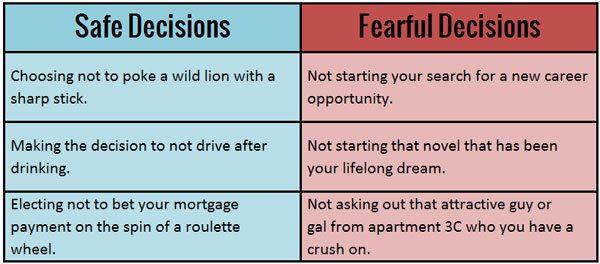Life
How Playing It Safe Can Ruin Your Life

Have you ever missed out on a great opportunity because you played it safe?
Think about it. Look back over your life and think about the things you could have done. The opportunities you could have taken, the people you could have befriended, the experiences you could have savoured.
But back then those things seemed scary and risky. Wanting to play it safe, you elected to stay in your comfort zone at the time.
From where you sit now, you can easily and clearly see that you should have acted upon some of those things. In retrospect, those things were scary or risky at all – just different and new. They were, in all actuality, blessings that you walked away from.
It’s a sobering and outright sad feeling, isn’t it?
Playing It Safe Isn’t About Safety At All
You’re not the only one who has done that. Most of us have a tendency to play it safe.
Some of us equate playing it safe with being sensible and prudent. But most of the time, it’s something else all together.
The real problem isn’t safety or risk at all. The real problem is fear.
As humans, we are hard-wired to allow fear into our decision making. Most of us simply don’t understand fear, where it comes from, or the role it plays in what we choose to do or not do.
By understanding it more, you can prevent fear from clouding your decision-making process.
It’s Not Brain Surgery
What if I were to tell you that there was a little tiny part of your brain that pre-wires you to avoid risk and play it safe? Well, there actually is.
It’s called the amygdala and it plays a big part in what motivates us to behave the way we do. One of the functions of the amygdala is processing emotions – particularly those associated with survival. Like the emotion of fear for instance.
When you are in a familiar situation that you know to be safe, your amygdala is happy and secure – and so are you. But when something new or seemingly risky comes along, the amygdala kicks into high gear. It lets you know, “Hey, we’re outside our comfort zone here. Retreat! Withdrawal!”
Sometimes that reaction can save your life. Other times it can hold you back from a more fulfilling life.
The trick is learning to know the difference between valid fears of very real danger to our safety – and invalid fears of something new.
Mauled or Embarrassed – The Choice Is Yours
There are basically two types of decisions we make when we perceive danger or consequences. The first type, I call safe decisions – which are survival based. They keep us alive and assure we have adequate food and shelter. The second type I refer to as fearful decisions – which tend to keep us from taking less life-threatening risks and prevent us from spreading our wings.
Let’s take a look at some examples of both.

Safe decisions come from a very real fear of severe consequences to your health, life, or quality of life – while fearful decisions come from someplace completely different.
Look at that right hand column. If any one of those scenarios goes as badly as it’s capable of going, what happens? Does anyone die, go to prison, or lose their shelter? No. As it turns out the things we fear most seem to be much more about our feelings than they are about very serious consequences.
“I am an old man and have known a great many troubles, but most of them have never happened.” – Mark Twain
Our Five Most Common Baseless Fears
In my professional life, I’ve noticed time and time again that there are five major feelings-based fears that people let trip them up on their path to a better life. You’ll notice that they’re all very closely related.
1: Fear of failure
Have you ever passed on an opportunity to try something truly exciting because you were afraid you might fail at it? I have. The ironic thing is the fact that if you don’t try, you’ve already failed. So there’s really not much to lose. And yet we talk ourselves into believing that by not risking failure we’re somehow better off.
2: Fear of rejection
If you pitched your idea to the boss, or asked out that cute girl you like, or submitted your novel to a publisher, you might get rejected – and rejection hurts. So instead of feeling that emotion, we limit our potential and call it “playing it safe.”
3: Fear of inadequacy
This one usually manifests itself as, “I’m not good enough to do this thing I really want to do.” While this fear doesn’t necessarily originate from survival instinct, it’s no less powerful than any of the others.
4: Fear of unworthiness
Closely related to the fear of inadequacy, the self-talk associated with the fear of unworthiness sounds like, “Who am I to think that I might achieve that thing?” It comes from a place of humility, which normally is a good thing. But it’s also self-deprecating and destructive.
5: Fear of further commitment
This one should sound familiar, because we’re all guilty of it from time to time. We don’t always pass on opportunity because we’re afraid that we’re not good enough. Sometimes we know darn well that we’re good enough, but the ramifications of succeeding and the additional commitment needed after success is achieved scare the bejesus out of us.
Fighting Emotion With Logic
So now that you know that these fears are normal and that you’re not the only one who struggles with them, the question becomes: What can you do to get over them?
I find that instead of fighting raw innate human fears head-to-head, it’s best to use logic to take their power away.
When you find yourself letting any of those fears stop you from bettering yourself, run yourself through these three questions:
1: What is the worst thing that could happen if I ignored my fear and did this?
Take out a pen and paper and list all the potential (realistic) consequences. Would there be a loss of life, health, or livelihood? Or is the real risk just having to temporarily deal with an uncomfortable emotion like rejection or embarrassment?
2: What is the absolute best thing that could happen if I ignored my fear and went for it?
List all these, too. How might your life be different? What things might you learn? Who might you have the opportunity to connect with?
3: Are the possible consequences under #1 worth the potential benefits under #2?
Take a good look at both lists and give this question some thought. If the consequence of a particular action is death and the upside is a 10% pay raise – then your choice is simple. Avoid death.
But if the consequence of your action is rejection and the potential benefit is your dream career, swallow your fear and go for it.
Logic Tames The Beast
I know this seems incredibly simple – and it is. It’s simple and obvious because we just took an emotional issue and made it logical.
When you take the emotional power away from your fear and look at the situation as data – good decisions become much easier.
Do me a favor. The next time you find yourself “playing it safe”, run yourself through this quick exercise. Reduce the emotional to the logical. Then come back and let us know how things turned out.
Time to speak up!
Share a time when you felt fearful but took the leap anyway. Or share a tip about taking calculated risks.
Life
9 Harsh Truths Every Young Man Must Face to Succeed in the Modern World
Before chasing success, every young man needs to face these 9 brutal realities shaping masculinity in the modern world.

Many young men today quietly battle depression, loneliness, and a sense of confusion about who they’re meant to be.
Some blame the lack of deep friendships or romantic relationships. Others feel lost in a digital world that often labels traditional masculinity as “toxic.”
But the truth is this: becoming a man in the modern age takes more than just surviving. It takes resilience, direction, and a willingness to grow even when no one’s watching.
Success doesn’t arrive by accident or luck. It’s built on discipline, sacrifice, and consistency.
Here are 9 harsh truths every young man should know if he wants to thrive, not just survive, in the digital age.
1. Never Use Your Illness as an Excuse
As Dr. Jordan B. Peterson often says, successful people don’t complain; they act.
Your illness, hardship, or struggle shouldn’t define your limits; it should define your motivation. Rest when you must, but always get back up and keep building your dreams. Motivation doesn’t appear magically. It comes after you take action.
Here are five key lessons I’ve learned from Dr. Peterson:
-
Learn to write clearly; clarity of thought makes you dangerous.
-
Read quality literature in your free time.
-
Nurture a strong relationship with your family.
-
Share your ideas publicly; your voice matters.
-
Become a “monster”, powerful, but disciplined enough to control it.
The best leaders and thinkers are grounded. They welcome criticism, adapt quickly, and keep moving forward no matter what.
2. You Can’t Please Everyone And That’s Okay
You don’t need a crowd of people to feel fulfilled. You need a few friends who genuinely accept you for who you are.
If your circle doesn’t bring out your best, it’s okay to walk away. Solitude can be a powerful teacher. It gives you space to understand what you truly want from life. Remember, successful men aren’t people-pleasers; they’re purpose-driven.
3. You Can Control the Process, Not the Outcome
Especially in creative work, writing, business, or content creation, you control effort, not results.
You might publish two articles a day, but you can’t dictate which one will go viral. Focus on mastery, not metrics. Many great writers toiled for years in obscurity before anyone noticed them. Rejection, criticism, and indifference are all part of the path.
The best creators focus on storytelling, not applause.
4. Rejection Is Never Personal
Rejection doesn’t mean you’re unworthy. It simply means your offer, idea, or timing didn’t align.
Every successful person has faced rejection repeatedly. What separates them is persistence and perspective. They see rejection as feedback, not failure. The faster you learn that truth, the faster you’ll grow.
5. Women Value Comfort and Security
Understanding women requires maturity and empathy.
Through books, lectures, and personal growth, I’ve learned that most women desire a man who is grounded, intelligent, confident, emotionally stable, and consistent. Some want humor, others intellect, but nearly all want to feel safe and supported.
Instead of chasing attention, work on self-improvement. Build competence and confidence, and the rest will follow naturally.
6. There’s No Such Thing as Failure, Only Lessons
A powerful lesson from Neuro-Linguistic Programming: failure only exists when you stop trying.
Every mistake brings data. Every setback builds wisdom. The most successful men aren’t fearless. They’ve simply learned to act despite fear.
Be proud of your scars. They’re proof you were brave enough to try.
7. Public Speaking Is an Art Form
Public speaking is one of the most valuable and underrated skills a man can master.
It’s not about perfection; it’s about connection. The best speakers tell stories, inspire confidence, and make people feel seen. They research deeply, speak honestly, and practice relentlessly.
If you can speak well, you can lead, sell, teach, and inspire. Start small, practice at work, in class, or even in front of a mirror, and watch your confidence skyrocket.
8. Teaching Is Leadership in Disguise
Great teachers are not just knowledgeable. They’re brave, compassionate, and disciplined.
Teaching forces you to articulate what you know, and in doing so, you master it at a deeper level. Whether you’re mentoring a peer, leading a team, or sharing insights online, teaching refines your purpose.
Lifelong learners become lifelong leaders.
9. Study Human Nature to Achieve Your Dreams
One of the toughest lessons to accept: most people are self-interested.
That’s not cynicism, it’s human nature. Understanding this helps you navigate relationships, business, and communication more effectively.
Everyone has a darker side, but successful people learn to channel theirs productively into discipline, creativity, and drive.
Psychology isn’t just theory; it’s a toolkit. Learn how people think, act, and decide, and you’ll know how to lead them, influence them, and even understand yourself better.
Final Thoughts
The digital age offers endless opportunities, but only to those who are willing to take responsibility, confront discomfort, and keep improving.
Becoming a man today means embracing the hard truths most avoid.
Because at the end of the day, success isn’t about luck. It’s about who you become when life tests you the most.
Change Your Mindset
The Four Types of Happiness: Which One Are You Living In?
Most people chase success only to find emptiness, this model reveals why true happiness lies somewhere else.

In a world driven by rapid technological growth and constant competition, many people unknowingly trade joy for achievement. (more…)
Change Your Mindset
The Secret Daily Routines Behind History’s Most Brilliant Thinkers
Uncover the daily rituals and hidden habits that powered history’s most brilliant minds to success.

Why Daily Rituals Matter
Every great achiever has one thing in common: discipline. Behind the novels, inventions, discoveries, and masterpieces are small, consistent habits repeated daily. (more…)
Finances
From Debt to Financial Independence: A Practical Roadmap Anyone Can Follow
It’s about having control over your money and not letting money control you.

The 21st century has brought incredible opportunities but also new challenges. Rapid technological change, global uncertainty, and shifting lifestyles have made many people think more deeply about financial freedom. (more…)
-

 Business4 weeks ago
Business4 weeks agoThinking of Buying A Business? These 6 Sectors Quietly Produce the Best Deals
-

 Change Your Mindset3 weeks ago
Change Your Mindset3 weeks agoWork-Life Balance Isn’t a Myth: Here’s How to Actually Make It Happen
-

 Change Your Mindset4 weeks ago
Change Your Mindset4 weeks agoThe Four Types of Happiness: Which One Are You Living In?
-

 Life3 weeks ago
Life3 weeks ago9 Harsh Truths Every Young Man Must Face to Succeed in the Modern World
-

 Success Advice2 weeks ago
Success Advice2 weeks agoInside the TikTok Resume Hack That’s Fooling Recruiters (For Now)
-

 Change Your Mindset2 weeks ago
Change Your Mindset2 weeks agoThe One Leadership Habit That Separates the Great From the Forgettable
-

 Personal Development1 week ago
Personal Development1 week agoThis Silent Habit Might Be Sabotaging Your Career
-

 Business6 days ago
Business6 days agoWhy Your E-Commerce Fulfilment Is Probably Broken (And How to Fix It)


























24 Comments